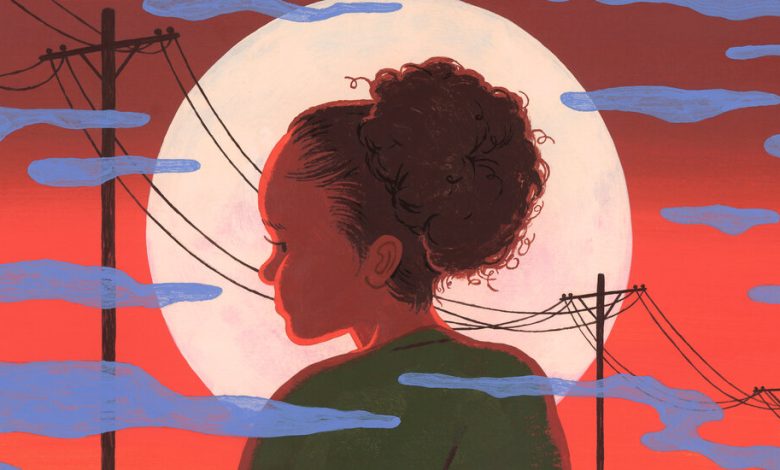Jacqueline Woodson and Amber McBride Look Backward to Look Forward

The remembrance of things past and the deconstruction of old traumas are at the heart of two exceptional new middle grade novels. “Remember Us,” by the National Book Award winner Jacqueline Woodson, and “Gone Wolf,” by Amber McBride, both draw from real-life events to imagine richly detailed worlds of pain and beauty.
Written in lyrical prose, REMEMBER US (Nancy Paulsen Books, 192 pp., $18.99, ages 10 and up) is a poetic time capsule from the 12-year-old Sage, an African American girl living in the Bushwick section of Brooklyn during the 1970s. Woodson’s narrator is the adult Sage, looking back at one frightening New York City summer when the susceptible wooden homes of Black Bushwick residents regularly ignited like matchsticks.
Today, Sage might identify as part of the L.G.B.T.Q. community. But in the more binarily gendered parlance of the ’70s, the tween struggles to figure out where she fits.
Happiest shooting hoops and being “one of the boys,” Sage uneasily relates to the girls on her block, who are interested in double dutch and hopscotch.
Complicating life, as she watches her neighbors’ homes burn around her, are Sage’s unresolved emotions over the death of her fireman father years before. He died heroically, a member of an organization of African American firefighters known as the Vulcan Society.
One afternoon during this summer of flames, Sage’s new neighbor Freddy dribbles onto her court. Beyond their shared fanaticism for basketball, Freddy and Sage discover other parallels: “We were both only children. And maybe because of that, it was easy to be quiet with him. Or talk with him about everything. We knew the silence that came with being alone in our rooms, and we knew how good it felt to listen. And to be heard too.”
Freddy speaks up for Sage and helps her appreciate her uniqueness after another boy berates and physically threatens her over it. An intimate friendship flourishes between the two young Knicks fans, one that will echo through the rest of their lives.
What struck me about this novel was not only its commemoration of those horrific Bushwick fires — many set by landlords seeking insurance money — but also how Woodson (“Brown Girl Dreaming”) conjures such a captivating, elegiac story from their ashes, per the poem that appears on its frontispiece:
After the year of fire
a vine rose up
through the rest of our lives
of smoke
of flame
of memory.
GONE WOLF (Feiwel & Friends, 352 pp., $17.99, ages 10 and up) also uses memory and lyricism to overcome earlier pain. At the same time, it is a celebration of African American history, and African American futures.
We first encounter our 12-year-old Black female protagonist, Inmate Eleven, living a bleak, seemingly fruitless existence in a small, spare cell. She receives visits from an emotionally detached white physician who conducts psychological conditioning, brutal white guards armed with Tasers and the occasional droning android. Her only “family” is a genetically modified wolf named Ira.
Ira lives with Eleven in her cell, which the two have never left — the outside world existing in Eleven’s consciousness as fragments snatched from books and from chance remarks made by her captors.
When a “Clone boy” named Larkin tells her that Inmate Eleven is “not a name” and suggests she has another one, she racks her brain and finally comes up with Imogen: “Imagine and Image are my favorite words. I can make a name out of that. … Imago, Imgine, Imoge, Imogen.”
It’s the year 2111, a bizarre future created after a second American Civil War. In a Southern breakaway from the United States, African Americans are bred to serve and be subjugated in what feels at times like a mash-up of the Hunger Games series and the film “Get Out.”
Just past the novel’s midpoint, however, McBride, winner of the 2022 Coretta Scott King/John Steptoe Award for New Talent and author of the young adult novel “Me (Moth),” diverges from her futuristic story line. She introduces a 12-year-old Black girl named Imogen who lives in post-pandemic 2022 America — still “united,” and not yet controlled by white supremacist mad scientists.
But Imogen (a mirror of Inmate Eleven) has her own set of challenges: She’s mourning horrible losses suffered during the pandemic and is eventually treated by an African American therapist suffering from her own haunted past. It’s an effective, expertly devised premise, though the novel’s more speculative first half might have benefited from further editing.
What results is a highly expressive storytelling experience that combines the two versions of Imogen/Inmate Eleven’s life and the histories of all African Americans into a lesson about surviving loss and pushing into the future. “Gone Wolf” is an especially timely read at a moment when Black history is being systematically erased in certain parts of our country.
In their author’s notes, Woodson and McBride both reference the historical events on which their novels are based — in Woodson’s case the Bushwick fires, in McBride’s the pandemics of corporal disease and sociopsychological racism. Both have crafted beautiful narratives that will help tweens process their grief after trauma.
David Barclay Moore is the author of “The Stars Beneath Our Feet” (a Coretta Scott King/John Steptoe Award winner), “Holler of the Fireflies” and “Boyogi.”
